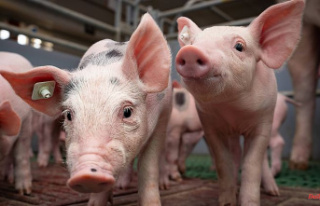With its attacks on civilian targets, especially on power plants, Russia has opened a new front in the war against Ukraine. Apparently, it's not just about revenge for the Crimean Bridge. Rolling power outages are already affecting public life.
A few weeks ago, the US fast-food restaurant chain McDonald's reopened its branches in Kyiv. For the first time since the great Russian invasion began, fries and burgers were served there, albeit under tight security. When more than 80 Russian missiles fell on Ukraine on Monday, restaurants stayed closed all day. They opened again on Tuesday, although the air alert lasted more than five hours in the morning, like the day before.
As deadly as the rocket attacks are, the immediate danger they pose isn't the only problem McDonald's -- like Ukraine as a whole -- has with it. On Wednesday, a branch of the burger chain in northern Kyiv had to close again due to the so-called rolling power outages. Russia also damaged two Kiev thermal power plants in its attacks on Ukraine's energy infrastructure. In order to avoid overloading the power grid, the operator had to switch off the electricity in parts of the city. There is a timeline of which boroughs could be affected and when. However, the plan will only be implemented if necessary.
"When we opened after the war began, everything went well. The mechanisms of how we react in the event of an air raid were trained quite well, even if the alarms are of course annoying," says Julia, who is part of the management of the affected branch. However, when the power went out, mobile internet and telephone did not work properly. "It was pretty chaotic. We couldn't communicate with our headquarters or our delivery service for the time being. I can only hope that the problems will be resolved in the next few days - it would be difficult to work like this in the long term."
In all, on Monday and Tuesday, Russia fired more than 100 missiles and several dozen of Iran's kamikaze drones, mostly at targets in Ukraine's energy infrastructure. According to the Ukrainian Ministry of Energy, around 30 percent of the energy infrastructure was affected by the attacks. It is noteworthy that the same objects were attacked on Tuesday as on Monday. There were further attacks against an important thermal power plant in the central Ukrainian district of Vinnytsia, and according to the local energy administration two substations were destroyed in the western Ukrainian city of Lviv.
In addition to the rolling blackouts, Ukraine is looking for other ways to save electricity. In many regions, street lighting is switched off, several large industrial companies are temporarily out of order and people are being asked to reduce their power consumption, especially in the evening between 5 p.m. and 11 p.m. For the time being, Kyiv is also refraining from exporting electricity, which was actually important because many previous sources of income have disappeared. Ukraine even wanted to expand electricity exports to the EU.
The electricity deficit across the country is currently around two gigawatts, which is quite a lot. For this reason, increasing power outages are to be expected throughout Ukraine in the next few days - not only in places directly affected by the Russian attacks. Ukraine manages to repair destroyed plants quite quickly. Despite this, Ukrainian experts say there are scenarios in which the country is threatened with a major blackout.
The attacked thermal power plants generate only 25 percent of Ukraine's electricity, while the nuclear power plants generate around 60 percent. However, if the Russians disable several units at the same time and cause major damage to the high-voltage lines, Ukraine would have to rely on the technically difficult import of electricity.
"The Russians want to switch off the electricity in the largest cities in Ukraine and thus not only weaken our country's defense potential, but also break the Ukrainians' will to resist," writes political scientist Volodymyr Fessenko, who is close to President Volodymyr Zelensky, on Facebook. "According to different sources, they actually wanted to carry out such an attack later - already during the heating season, just before winter or at the beginning of it. However, they had to hurry because of the situation around the Crimean bridge."
Fessenko calls these attacks "a new tactic and a new front against Ukraine." He emphasizes that in some cases the same objects were attacked several times: "The Russian army cannot defeat the Ukrainian armed forces on the battlefield and is therefore using terrorist methods. Incidentally, the infrastructure war is being waged not only against Ukraine, but also against the West." The political scientist thinks it's partly beneficial that the attacks happened now rather than later in the year.
"We now have time, together with our international partners, to work out methods of resistance against Putin's terrorist tactics," Fessenko said. "And the primary concern here is to strengthen our anti-aircraft systems around major cities and critical infrastructure." In fact, how stable Ukraine will survive the coming winter will probably depend primarily on the deliveries of modern anti-aircraft systems. In any case, Julia, the McDonald's employee in Kyiv, doesn't want to be disturbed by the attacks. "Whatever Russia attacks, we will continue unchanged as a country."












